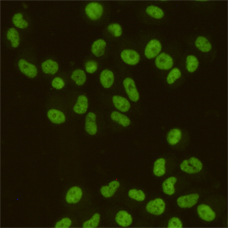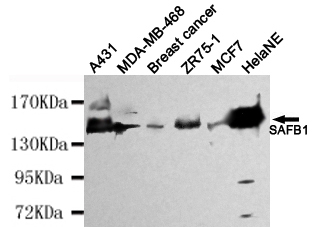-
Product Name
Anti-SAFB1 (2E8) Mouse antibody
- Documents
-
Description
SAFB1 (2E8) Mouse monoclonal antibody
-
Tested applications
WB, ICC/IF, ChIP
-
Species reactivity
Human
-
Alternative names
DKFZp779C1727;glutathione S transferase fusion protein;HAP;HET;HSP27 ERE TATA binding protein;HSP27 ERE-TATA-binding protein;HSP27 estrogen response element-TATA box-binding protein;SAF B;SAF-B1;SAFB 1;SAFB;SAFB1;SAFB1_HUMAN;scaffold attachment factor B1. antibody
-
Isotype
Mouse IgG1
-
Preparation
Antigen: Purified recombinant human SAFB1 protein fragments expressed in E.coli.
-
Clonality
Monoclonal
-
Formulation
Purified mouse monoclonal antibody in buffer containing 0.1M Tris-Glycine (pH 7.4 150 mM NaCl) with 0.02% sodium azide 50% glycerol
-
Storage instructions
Store at 4°C short term. Store at -20°C long term. Avoid freeze / thaw cycle.
-
Applications
WB: 1/1000
;ICC: 1/200
-
Validations

Immunocytochemistry staining of HeLa cells fixed with 4% Paraformaldehyde and using SAFB1 mouse mAb (dilution 1:200).

Western blot detection of SAFB1 in HelaNE,A431,MDA-MB-468,Breast cancer,ZR75-1 and MCF7 cell lysates using SAFB1 mouse mAb (1:4000 diluted).Predicted band size: 130kDa.Observed band size: 130kDa.
-
Background
Swiss-Prot Acc.Q15424.This gene encodes a DNA-binding protein which has high specificity for scaffold or matrix attachment region DNA elements (S/MAR DNA). This protein is thought to be involved in attaching the base of chromatin loops to the nuclear matrix but there is conflicting evidence as to whether this protein is a component of chromatin or a nuclear matrix protein. Scaffold attachment factors are a specific subset of nuclear matrix proteins (NMP) that specifically bind to S/MAR. The encoded protein is thought to serve as a molecular base to assemble a 'transcriptosome complex' in the vicinity of actively transcribed genes. It is involved in the regulation of heat shock protein 27 transcription, can act as an estrogen receptor co-repressor and is a candidate for breast tumorigenesis. This gene is arranged head-to-head with a similar gene whose product has the same functions. Multiple transcript variants encoding different isoforms have been found for this gene.
Related Products / Services
Please note: All products are "FOR RESEARCH USE ONLY AND ARE NOT INTENDED FOR DIAGNOSTIC OR THERAPEUTIC USE"
